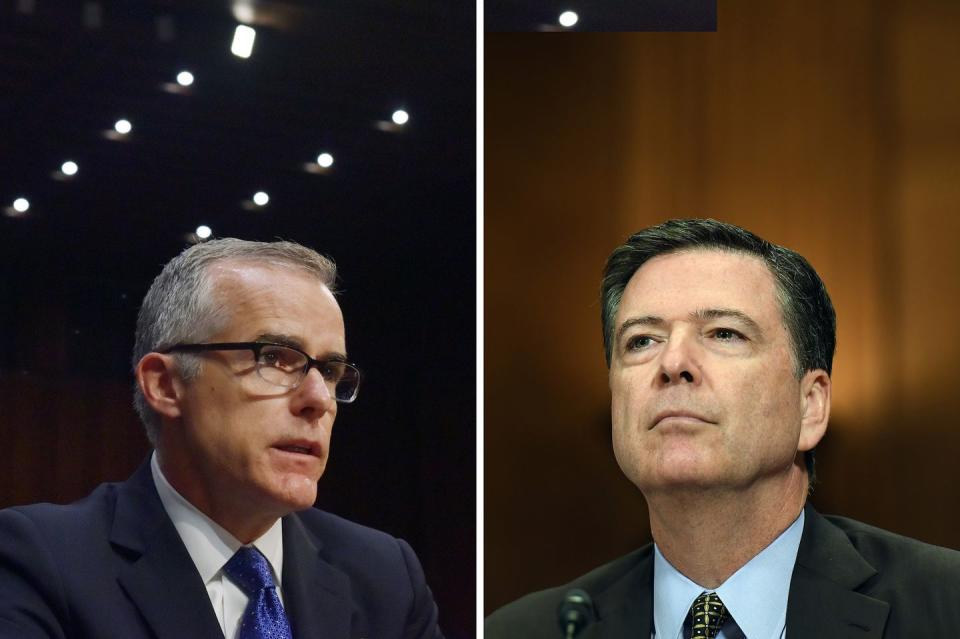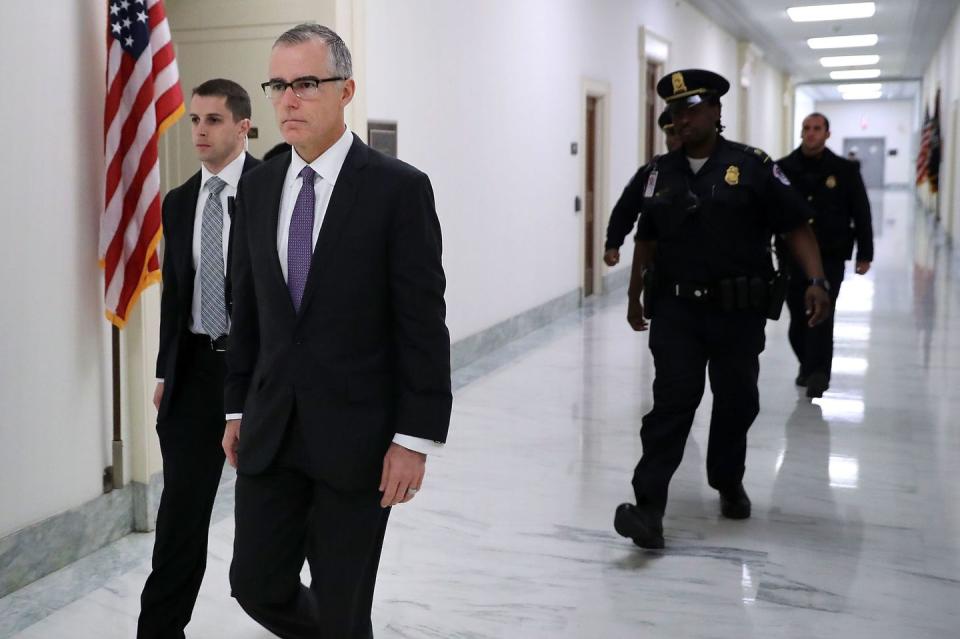Former Top FBI Officials Really Love Comparing Trump to a Mob Boss

Some of the president's defenders are eager to highlight the gap between the possible offenses for which he is under investigation. On one hand, there's outright conspiracy with agents of a hostile foreign power to influence an American presidential election. On the other, there's obstruction of justice. The first is certainly the more catastrophic, but his backers often paint the other as a "process crime," or in similar bloodless terms meant to drain it of severity. (The same treatment is given to the lengthy list of Presidential Associates who were caught perjuring themselves to federal law enforcement.) He just tried to put a stop to an investigation he thought was a Witch Hunt, you see.

Except the president should not put a stop to any investigation under any circumstances, much less when it involves, say, his own national security adviser. Yet Trump sought to interfere with it repeatedly, including by asking the then-FBI director, James Comey, to stop the Bureau's investigation of Michael Flynn-his campaign surrogate and, at one time, his chief national security aide. He then fired Comey in May 2017 and soon said, on national television, that he was thinking of "the Russia thing" when he did it. The next morning, Trump hosted two Russian ambassadors in the Oval Office and told them firing Comey, whom he called a "nutjob," had eased the pressure of the investigation. He also gave them classified information. In the best-case scenario, that last part was because the President of the United States is unable to control what he says to people.
Now that Andrew McCabe-the former deputy director of the FBI-turned-acting director when Comey was fired-is on a book tour, we're learning his side of what happened in the days between when Comey was fired and special counsel Robert Mueller was appointed to take over the investigation. In a TODAY show interview this Tuesday morning, McCabe laid out a simple logic for why the Russia probe grew to include Trump and the obstruction inquiry: why would an American president be so hostile towards finding out everything we could about Russia's attempts to meddle in our elections? Why would he take such extreme measures to torpedo the probe?
Former FBI director Andrew McCabe tells @TODAYshow he thought it "might be possible" President Trump was secretly working for Russia, citing Trump's repeated attempts to undermine the investigation into his campaign’s dealings with Russia. pic.twitter.com/YkHJHz9tlw
- Aaron Rupar (@atrupar) February 19, 2019
It's important to note this isn't an argument for the idea the president is guilty on any conspiracy charge, only that his possible involvement in the meddling had to be investigated once he started interfering in the investigation. It is possible that the President of the United States was not involved in the Russian ratfucking, but that his impulsiveness and obsessive regard for his own brand and political prospects led him to undermine the rule of law and attempts to safeguard American national security and election integrity. Once again, the most charitable reading of the president's conduct is that he struggles to elevate the national interest above his own personal priorities.

(This also applies to McCabe's dismissal. Trump fired him two days before his retirement, supposedly based on a Justice Department Inspector General's report that McCabe now "completely rejects" as "a pretext to reach the conclusion that was being demanded by the president of the United States." Considering Trump had attacked McCabe relentlessly in public, this doesn't seem out of the question. Now, Trump routinely includes McCabe in the group of officials who once conducted the Russia probe that were fired in disgrace. He does not mention that he did the firing, and that they were investigating him.)
McCabe also had some intel on our brave congressional leaders, some of whom have since made it their business to muddy the waters around the probe-or, in the case of Devin Nunes, go a whole lot farther than that. Nunes is one of the so-called "Gang of Eight" from Congress that McCabe briefed on the investigation in the days following Comey's firing. According to McCabe, none of them disputed the FBI's decision to expand the probe on any basis.
McCabe says top Republicans in Congress were briefed about FBI's counterintelligence investigation into Trump -- and raised no objections. pic.twitter.com/ClqJ1McjWU
- Aaron Rupar (@atrupar) February 19, 2019
So Nunes and Mitch McConnell had no objections when the case for moving forward with the investigation was laid out. But maybe they've developed legitimate qualms since.
• Maybe they developed some as the probe started exposing the president's associates as having perjured themselves to FBI agents.
• Maybe they found the line of inquiry less legitimate as we came to learn Trump's top campaign aides held a meeting at Trump Tower with a Kremlin-linked lawyer with the express purpose of getting dirt on their political opponent, then lied about every aspect of it at every turn.
• Maybe they found it less reasonable when we learned Trump was working a deal to build a Trump Tower Moscow throughout the campaign, a deal that would have required the sign-off of the Russian oligarchy led by Vladimir Putin.
• Maybe they grew concerned about the probe even when we learned Trump's campaign manager is accused of shoveling private campaign polling data to an associate linked to Russian intelligence services and getting the Republican Party platform rewritten to soften its stance towards Russia's activities in Ukraine.
• Maybe they thought it was a coincidence that Trump's business associates were working on a "peace plan" for Ukraine that would have seen the United States lift its sanctions on Vladimir Putin and his oligarch cronies.
Or maybe these Republican members of Congress are just playing politics in public, trying to hold onto the support of his personality cult while the idol himself sinks deeper into the mire. Many of these facts were not public when McCabe briefed the group and still none of them, according to McCabe, had objections.

Elsewhere, McCabe could be found talking to Natasha Bertrand for The Atlantic. He once again highlighted the conflict held by Rod Rosenstein, the deputy attorney general who, once Jeff Sessions recused himself in perhaps the only honorable act of his miserable public career, came to oversee Special Counsel Robert Mueller's probe. Rosenstein wrote the letter Trump cited as justification for firing James Comey, then took over the probe Comey may well have been fired for running. (The letter cited Comey's handling of the Hillary Clinton email investigation, an absurd pretense, and Rosenstein has since claimed he was used.)
McCabe ratcheted things up a level by claiming, "Rod is the guy that volunteered to write the memo firing Jim Comey, and then, in the days after, he asked me to put him in touch with Jim Comey to discuss the special-counsel selection." That is a clear conflict, though there is no evidence Rosenstein (or Mueller, for that matter) has mishandled the probe. Though you wouldn't know that from the president's deranged tweets.

The Atlantic interview is also intriguing because in it, McCabe becomes just the latest law-enforcement figure who dealt directly with Trump to describe his demeanor and conduct-particularly when building an organization-as having a lot in common with the leader of a criminal syndicate. He also suggested Mueller is pursuing his probe with a similar framework to a mob investigation.
Bertrand: Shifting gears now to the special-counsel investigation, legal experts have often observed that Mueller seems to be investigating Trump and his campaign like he would a Mafia family. You spent a decade going after the Russian mob in New York. Do you think, given what we’ve seen from Mueller so far, that Trump is still a target?
McCabe: There are a lot of patterns in what Director Mueller is doing that are very familiar to me. Those patterns of targeting and investigating people who may have had more of a hands-on role, albeit at a lower level, and using those investigations to develop information and informants and cooperators-I mean, it is really the classic enterprise investigation that Director Mueller and his team have pursued. So do I think the case into Trump is open or closed? There’s absolutely no reason for me to believe that it’s closed. And you can certainly look at what Mueller’s done so far to say he is doing exactly what we would do with the investigation of a cartel or an organized-crime family.

Bertrand: So Trump strikes you as someone who runs his organization, and now is running his administration, like the mob.
McCabe: Well, that was my own experience with him, right? That kind of overwhelming or overriding focus on loyalty and sorting everybody out immediately-like, you’re either with us or you’re against us. Those are all traits that you see in organized-crime enterprises.
Considering pretty much every organization Trump has ever run is under investigation or shuttered amid allegations of fraud, this seems like a very reasonable approach. Trump "University" was shut down and he agreed to pay the victims $25 million. The Trump Foundation was shut down, and the New York attorney general is attempting to bar Trump and his kids from sitting on the board of any charity in New York State for 10 years. The Trump Organization is under investigation. The Trump campaign is under investigation. His transition team is under investigation. His inaugural committee is under investigation. His administration is under investigation, and his associates in government are continually run out of town as their roles are exposed in The Great American Heist.
“It has occurred to me on a number of occasions that, you know, Donald Trump and I know some of the same people,” McCabe told Bertrand. He was referring to some of the people he came to "know" in his time at the FBI's New York bureau, where he spent a decade investigating Russian organized crime.
As always, the public statements of senior law enforcement and intelligence officials deserve the utmost scrutiny. The long and sometimes ugly records of the agencies they run demand it. But in this case, they're up against a guy who lied publicly 15 times a day last year. His record running any organization of any kind is impressively sketchy, to say the least. It's not hard for reasonable people to assign benefit of the doubt, even if it's all relative.
('You Might Also Like',)
